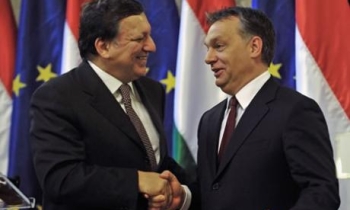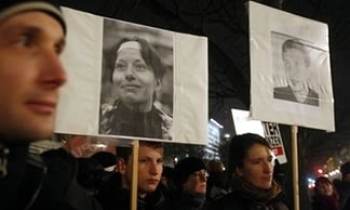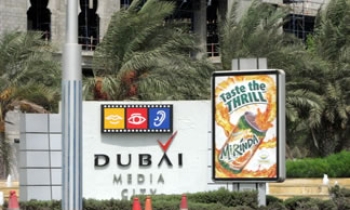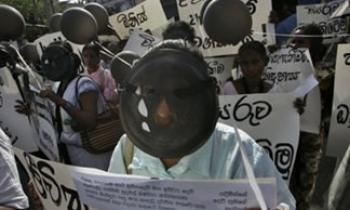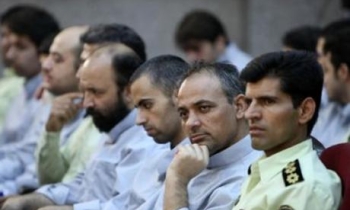COLOMBO, May 2 (IPS) - "Press and freedom? In Sri Lanka?" was the incredulous response of one journalist when asked what he thought of celebrating World Press Freedom Day, May 3. "Keep my name out of this," was all he would further venture to say.
That response summed up the near-petrified state of the media in this island country where a fierce ethnic civil war between Tamil rebels led by the Liberation Tigers of Tamil Eelam (LTTE) and the Sri Lankan armed forces has crept into newsrooms, with journalists being asked to shed their neutrality and take a stand. The choice is limited -- with the government or against it.
There is room for some subtlety. In mid-April, Sri Lankan Defence Secretary Gotabhaya Rajapakse called up the highly respected editor of the Colombo Daily Mirror, Champika Liyanaarachchi, for what a government website described afterwards as a "frank exchange of ideas on two controversial articles published in said newspaper".
As for allegations made by Liyanaarachchi, the country's first woman newspaper editor, that death threats were issued to her and a member of her staff by the defence secretary -- who happens to be the brother of President Mahinda Rajapakse -- the website resorted to flat denial.
A day after the alleged threats were made, on Apr. 18, British High Commissioner in Sri Lanka Dominick Chilcott chose to visit Liyanaarachchi in her office. He was rewarded by being "invited" by the defence secretary to visit his office. "They talked about the role of the media," a spokesman said of the "friendly meeting" which lasted for close to an hour. "The high commissioner and the defence secretary agreed that confidentiality would be preserved," he said.
Yet, the government-run Daily News in its Apr. 20 edition quoted "sources close to the defence secretary" to say that "a senior journalist had completely misled the High Commissioner when he visited a newspaper office" and that "the High Commissioner had realised that the journalist had misled him and given him bogus information".
The paper's sources said all this was "part of the campaign to discredit the Defence Secretary and to demoralise the forces after the LTTE was defeated in the East" and that "interested parties were making desperate attempts to create divisions between the Tamils and the Muslims in the East and these elements were behind this campaign".
"We strongly feel this latest assault on free media essentially ridicules this government's promises to uphold and strengthen media freedom. Given the volatile situation in the country," the Free Media Movement (FMM), the country's most respected media rights group, said in a statement.
The FMM charged the government with forcing the media to adopt a role supportive of those in power.
"There are accepted norms and legal procedures in place to deal with the press and false reporting if any. I don't think that Sri Lankan media had descended to such low levels that you have to call and threaten journalists -- or shoot them," Poddala Jayantha, general secretary of the Working Journalists Association (WJA), told IPS.
Poddala's reference was to the murder last week of Selwaraja Rajivewaran, a Tamil journalist working in the restive Jaffna Peninsula in northern Sri Lanka, which raised the number of unresolved killings of journalists and media workers in the country, over the last two years, to 11.
The Rajivewaran killing followed pattern. He was shot by unidentified gunmen as he cycled to work within 200 metres of a checkpoint maintained by the Sri Lankan Army, according to the FMM.
"It is a long list that keeps getting longer and the authorities are not keen on taking any action. It is as if they want the suffocation of the media to continue," Sunanda Deshapriya of the FMM told IPS.
"What we see is journalists becoming the targets, and no one cares for their safety," Deshapriya said. Several journalists have sought refuge overseas and others, including Deshapriya, have ended up on death lists. "Anyone who is not toeing the line of the power elites is considered an enemy -- this is true of all sides," he said.
At least eight of the dead journalists were ethnic Tamils -- a pointer to the nature of the protracted conflict in this country. Although a ceasefire signed in 2002 is yet to be formally called off, both government forces and Tamil Tigers have returned to open warfare in which more than 4,000 people have died since December 2005. At least 65,000 people have died in the on-off civil war that has been raging on the island for more than two decades.
The shrinking of space around the media commenced in late 2005 with the escalation of hostilities between government forces and the LTTE, according to the WJA. Apart from the violence, journalists are denied access to areas under LTTE control so that reporting from conflict-affected areas has become impossible.
"Freedom of expression is one of the basic pillars of a democratic society. A free media is necessary to inform both decision-makers and the people about prevailing realities in the country. We call on the government to inquire into these incidents and to insist that its members follow a code of conduct that accepts the fundamental principles of democratic governance, including respect for the freedom of the media," said the executive director of the National Peace Council Jehan Perera.

